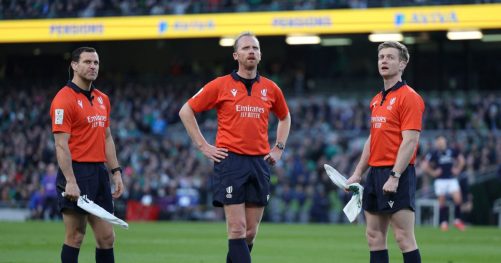After introduction through other competitions, World Rugby has announced that the Television Match Official ‘bunker concept’ is to be trialled first at the upcoming World Rugby U20 Championship in June.
To be hosted by South Africa, the U20 (under 20) Championships are the perfect stage to initiate any new match officiating variant [tool]. And the TMO (television match official) continues to be an area of the sport where some controversial decisions have been seen as influencing match outcomes.
World Rugby continues to be open to innovations or technology that have the potential to assist officiating, enhance game flow and advance the welfare of participants. And getting the right decision, while letting the game flow is a difficult compromise. It is hoped that ideas like this might take pressure off on-field officials, to those who have time and the technology to properly review player actions.

“The Television Match Official bunker is a concept that reflects that mission, having the potential to reduce lengthy stoppages and promote accurate decision-making for foul play, as evidenced in the current Super Rugby Pacific trial,” a World Rugby statement explained.
Television Match Official ‘Bunker concept’ trialled at World Rugby U20 Championship
While continuing to consult with stakeholders on this topic, World Rugby can confirm that it will operate a TMO Bunker trial at the World Rugby U20 Championship 2023, hosted in South Africa in June to enable further evaluation. The trial will be based on the following principles:
- Clear and obvious red cards for foul play involving contact with the head will receive a red card resulting in the player being permanently being removed from the game and unable to be replaced
- For any incident where a red card is not obvious, a yellow card will be issued and dedicated foul play reviewers in a central bunker review the incident using all available technology and footage
- Once 10 minutes has elapsed, the yellow card is either upheld and the player returns to the action or it is upgraded and the player permanently leaves the field, unable to be replaced
Consideration will be given to furthering the trial in the test arena ahead of Rugby World Cup 2023 in France ‘if the trial is deemed successful’ and further adoption is supported by the elite rugby stakeholders, including importantly match officials, players, unions, and competitions.
________________________________________________
Editorial: while trialled at Super Rugby level, the concept has appeared to speed up decision-making. Although, as many Yellow Cards have been awarded, the call to increase the infringement level to a Red Card has resulted in several players being ‘walked’ to the changing rooms. Even if that TMO judgement could have been made instantly, by having the technology and not being rushed, several calls to upgrade to a red, were proven correct (with citings following, and suspension handed down to the player).
One area of contention might be how multiple yellow cards might add additional pressure to the timeline of finalizing any penalty. With ten minutes only, multiple infringements will ask off-field officials to force decisions when time is limited. Thus, the second player could receive an unnecessary red card, if time is about to elapse (as a matter of course).
So the benefits will rightly outweight the negatives, representing the interests of the TMO and the player’s right to a fair summary, can be influenced by limitations of time. One issue that more scrutiny could result in a miscarriage of justice, by time pressures unseen prior to the ‘bunker concept’.
“Main photo credit World Rugby website“



